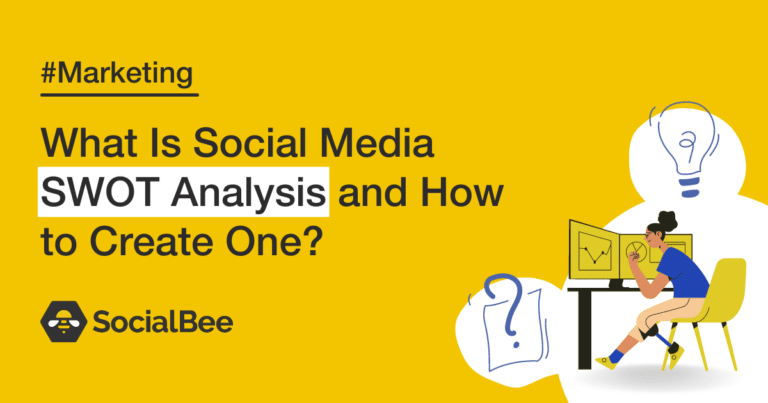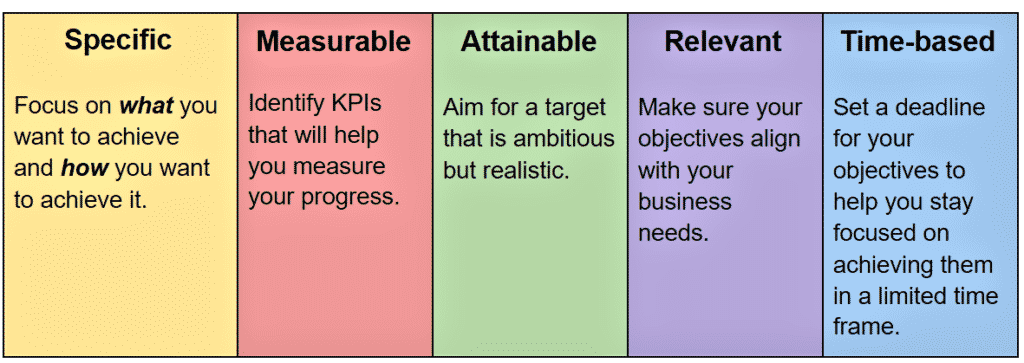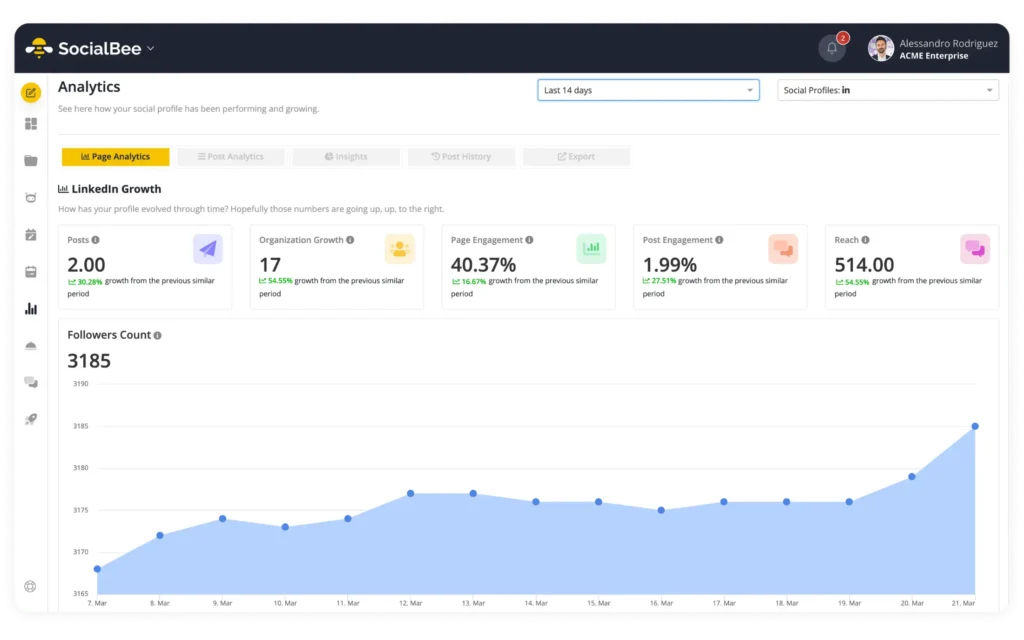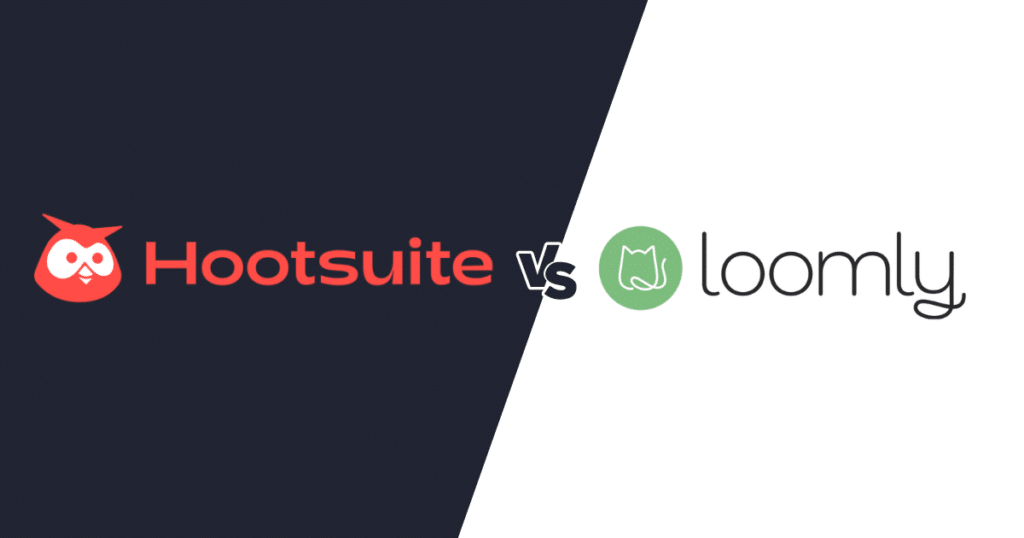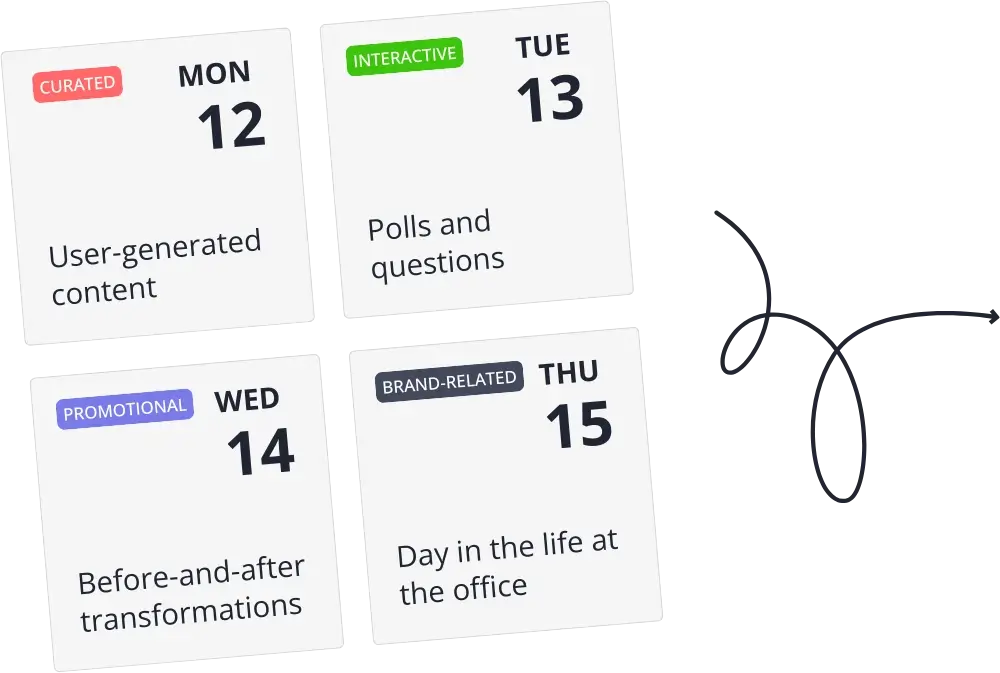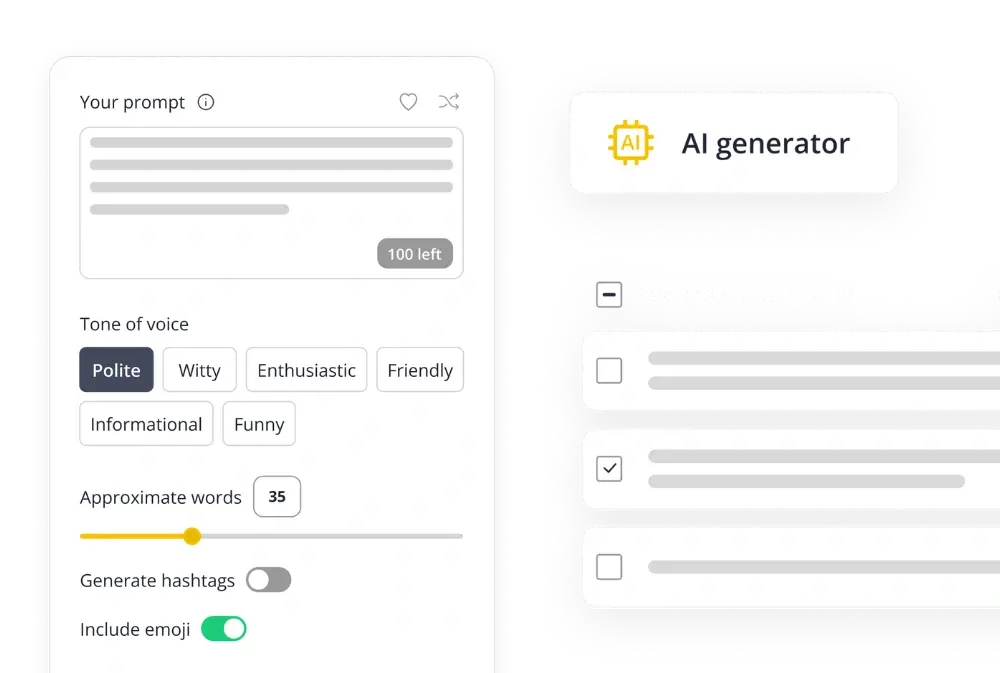
Guest Author
To make sure you stay relevant on social media and keep up with your potential and existing customers, it is essential to perform a social media SWOT analysis from time to time.
If you already have a defined social media marketing strategy, but you are unsure whether your efforts still help you reach your business goals, then it’s time to analyze your social profiles based on both internal and external factors!
Now, the big issue is, how do you even start? In this article, we will be dissecting everything you need to know about creating a social media SWOT analysis for your business.
We’re SocialBee LABS SRL, part of WebPros. We use the information you provide to share relevant content and product updates, as outlined in our Privacy Policy. You can opt out anytime.

What Is a SWOT Analysis?
A SWOT analysis is a strategic planning technique used by many businesses to discover external and internal factors (strengths, weaknesses, opportunities, and threats) that directly influence their performance and growth.
The main goal of a SWOT analysis is to identify a company’s competitive position on the market and build an effective strategy based on a thorough evaluation of the organization and the context in which it exists.
In this case, we will be applying this business framework to a social media management scenario. A social media SWOT analysis is therefore auditing your social media performance.
A SWOT analysis stands for:
- Strengths (internal factor): What do you excel at? What are your brand’s advantages or strengths? (clear brand voice, an engaged follower and customer base, multiple content resources, the content performs well, etc.)
- Weaknesses (internal factor): What are the areas of your business where you might be lacking? What internal issues could prevent you from achieving your objectives? (budget cuts, unsuccessful strategies, etc.)
- Opportunities (external factor): What are your main business growth opportunities? Are there any market trends you can take advantage of to generate new leads? (weak competition in your area, your services/products grew in popularity, etc.)
- Threats (external factor): What factors from the outside could sabotage your marketing efforts? (competitors, economic conditions, negative feedback, and so on)
The results of this analysis can enhance your social media efforts. The good thing is that it is not restricted to any particular type of business—it can work for any brand.
Benefits of a Social Media SWOT Analysis
As a business owner or social media manager, it’s well worth your time to undertake a SWOT analysis for your social channels.
This way, you will be able to adapt your social media strategy according to your current needs, without investing additional resources in time-consuming activities.
Here are the benefits of running a social media SWOT analysis are:
- In-depth market knowledge
- Setting and achieving SMART marketing goals
- Informed decision-making
- Improved content strategy
Now, let’s deep dive into each of them!
1. In-Depth Market Knowledge
When you understand the business context in which you position your brand, you can plan your marketing initiatives strategically in relation to both your audience and competitors.
For example, businesses in the automotive industry can use social media SWOT analysis to study their competitors as well as the state of the market, prices, demand, etc. This can give them insight into the whole process of online car marketing. Thus, they can make informed marketing decisions while comparing themselves with other players in the market.
2. Setting and Achieving SMART Marketing Goals
If you don’t recall, SMART goals are defined by five characteristics: specific, measurable, achievable, realistic, and time-sensitive.
The SMART goals formula brings value to your small business by helping you develop targeted social media campaigns.
Without clearly defined goals, you won’t be able to come up with a strategy dedicated to your specific marketing aspirations. After all, how can you achieve something if you don’t know what you want to accomplish?
A social media SWOT analysis introduces you to the exact areas you need to focus your marketing on.
More so, it allows you to work according to current market competition. Remember that SWOT analysis also checks your competitors’ performance in relation to yours.
3. Informed Decision-Making
The social data gathered after performing a SWOT analysis can be used in other parts of your business. This information on strengths, weaknesses, opportunities, and threats kindles viable business decisions.
Should you invest more in social ads, or should you switch to email marketing? Would the content of your best-performing posts be suitable for more social media networks?
Having clear social media reports and analyses will help you better manage your marketing resources.
4. Improved Content Strategy
A social media SWOT analysis helps you find out what type of content your audience loves most. As a result, you will build a strong active community that will constantly interact with your posts.
Let’s say you own a skincare brand. If you start posting content addressed to the general audience, you won’t be able to get noticed among the competition.
Develop a good digital marketing strategy that addresses their challenges and desires. This will help with customer-tailored content creation for your business while also building a strong community around your business.
Steps Involved in Creating a Social Media SWOT Analysis
Now that you know what SWOT analysis is and how it can improve your business, let’s dive into each of the steps you need to take to build one.
Here is how to run a social media SWOT analysis:
- Audit your social media strategy
- Find out your social media strengths
- Discover what can be improved in your strategy
- Look for growth opportunities
- Identify possible threats
1. Audit Your Social Media Strategy
The first step to building a social media SWOT analysis (especially if you own a new company) is to analyze your current strategy. This will help you identify the SWOT analysis components: strength, weakness, opportunities, and threats.
Make sure you use a trustworthy social media analytics tool to keep track of each post’s engagement rate, comments, likes, shares, and impressions to see what works best for your existing audience.
Thankfully, with tools like SocialBee, you can get quick access to all of your data and export your social media reports in a PDF format.
With SocialBee you can monitor your social media performance and identify your most engaging post types and content categories.
Start our 14-day free trial and get a 360° view of your social strategy!
We’re SocialBee LABS SRL, part of WebPros. We use the information you provide to share relevant content and product updates, as outlined in our Privacy Policy. You can opt out anytime.
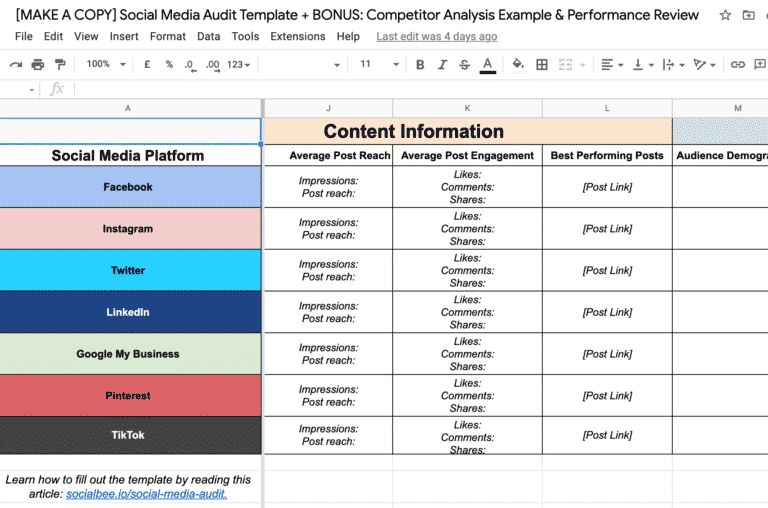
2. Find Out Your Social Media Strengths
For you to be able to further build on your strengths, it is important to be aware of what you are doing well. When you start your SWOT analysis, identify the areas where you are already a force to contend with.
It’s time for you to find out what you do best on social media. Thankfully, you can get answers to this from your measured metrics.
When identifying strengths, take into consideration the following items:
- Your most active and most followed social platform
- Your top-performing captions and post
- Your most engaging content
- Your unique selling proposition
Your strengths help you stand out from the crowd, and if they are managed correctly, they can become your best marketing weapons for social media success.
3. Discover What Can Be Improved in Your Strategy
Now that you are done plumbing your strength, it is time to face the bitter truth. It is time to figure out the areas you need to improve: your weaknesses.
One thing about this is that they are just a reverse of your strength. “What are we doing wrong?”— this is the question to address here. But, again, your analytics will answer questions related to these types of matters.
As a social media marketer, some weaknesses you might need to address are:
- Poor brand representation
- Low-quality content
- Less activity on some social platforms
- Inconsistent posting patterns
Improving in these areas sets you apart from competition and shows growth.
4. Look for Growth Opportunities
This part of the process requires a bit of creativity. It is all about looking for untapped growth avenues.
This includes looking for what customers need and how you can seize the opportunity. It also requires you to analyze your risk and your potential rewards.
You can explore other social media channels to see new features that can help you deliver more engaging content.
5. Identify Possible Threats
Always consider worst-case scenarios as you plan your social media campaign. You always have to be aware of what might come between you and your social media marketing goals and do your best to prevent any obstacles.
Social media threats include:
- Negative comments from customers
- Mass unfollows
- Algorithm changes that give you poor online visibility
- A shift in your target market demographics
- New market initiatives from competitors
Preparing for these threats before they happen is critical for business growth.
How Can a Social Media SWOT Analysis Improve Your Business?
Social media has become a very powerful marketing tool in the marketing world.
Analyzing the areas of strength and weakness, as well as opportunities and threats on social media, is essential. It shows you where to improve and where to tread with caution. It also shows you where your competitors are heading and how to outsmart them.
SWOT analyses also allow you to better understand your niche market as well as learn more about your target audience. This will help you develop a social media strategy that makes it easier for you to keep up with industry standards and deliver quality to your customers with every new initiative.
It’s Time to Analyze Your Social Media Marketing Strategy!
The notion of a SWOT analysis might sound intimidating. But now that you have a good grasp of the concept, you are ready to use it in your own social media marketing strategy.
But, this is not a one-time practice. It must be performed on a regular basis to ensure you are not doing something out of place at any point. For instance, if you are planning a social media campaign, you should run a social audit before and after it’s done to identify growth opportunities and weaknesses.
In a nutshell, the more you can hold your strength, improve on your weakness, maximize your opportunities, and prepare for threats, the better your chances of achieving your business goals.
And worry not, we have got your analytics covered. With SocialBee, you can analyze your content performance on all social media sites. Start your 14-day free trial now and measure the success of your social media campaigns!
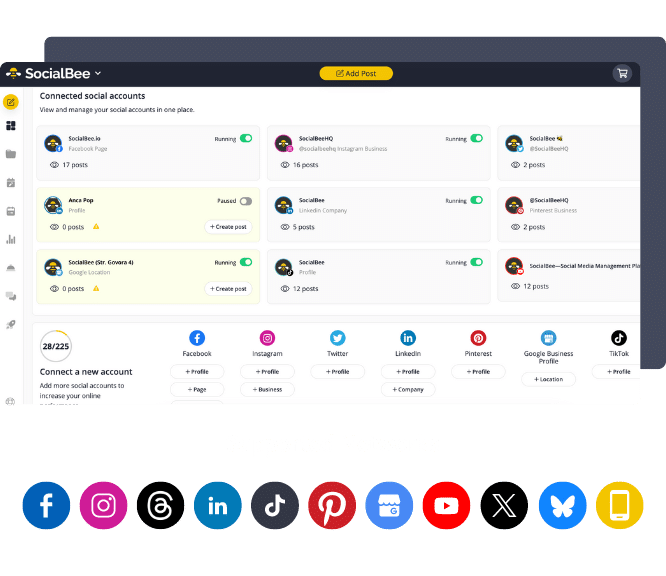
About the author: Dan is a digital marketing expert with hands-on experience in digital marketing since 2007. Being an expert in link-building services, he has helped many clients in their hard times, he has been building teams and coaching others to foster great innovation. His profound knowledge and skills in solving real-time problems helped Dan on his way to success. Above all, he has a great hobby of photography and enjoys traveling.
